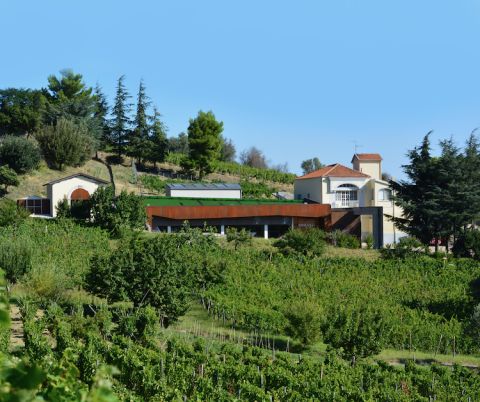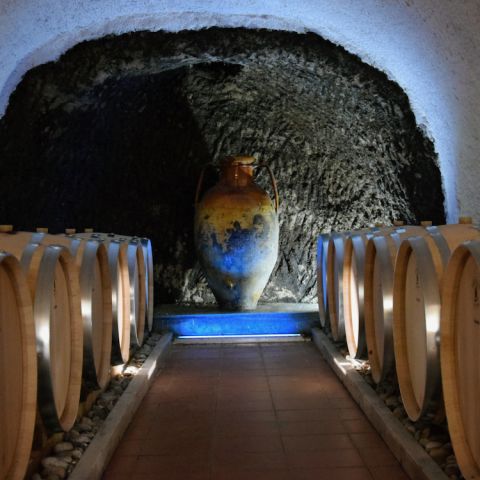Elena Fucci, Titolo 2018/19 Aglianico del Vulture

Julia and Walter share their enthusiasm for this elegant and ageworthy southern Italian red.
2019 from €27.50, 35.87 Swiss francs, £34.48, $39.90, HK$464
2018 from €23.92, $29.99, HK$252.80, 37 Swiss francs, £34.48, AU$125
'Elena Fucci is part of a small but growing group of new-generation Vulture producers changing radically the course of Aglianico del Vulture, setting their sights on elegance and finesse rather than concentration, tannic power and elevated alcohol levels.' Thus spake our inimitable Italy editor Walter Speller, who visited Elena Fucci and other producers in this part of Basilicata, southern Italy, earlier this year. (Look out for his forthcoming report.)
Coincidentally, not long before Walter's visit, Elena Fucci contacted me and offered to send samples of her most recent releases. I jumped at the opportunity as I don't get to taste wines from this region very often.
In 2000, Elena Fucci's family was trying to decide whether to sell the 6 ha/15 acres of vineyards around the family home on the slopes at the foot of the dormant volcano Mount Vulture. The vineyards were bought by her grandfather Generoso in the 1960s and while he and his father had looked after the vines, they had always sold the fruit and kept back just enough for their their own domestic winemaking and consumption. Fucci's parents were both teachers and no one in the family was planning to make a life out of winegrowing.
As Fucci explains on her website:
'Interested buyers knocking at our door were numerous, but at the last moment I took a shot to the heart. I could not bear the idea that someone may take away from our family the vineyard that I grew up in (our house is located right in the middle of the vineyard) or accept the possibility that another name may do something great with the oldest vineyards on Mount Vulture; the majority of which are 55-60 years old, while some were planted over 70 years ago. Thus, I completely changed the plans I had for my future and my family and I decided to invest in our area and in the resource that allowed my father, and before him, my grandparents and great-grandparents to live and grow in Vulture.'
Fortunately for us, the 'shot to the heart' and the work, investment and commitment of the intervening two decades, built on the foundations laid by her grandfather, have resulted in wonderful wines. While Fucci was at the University of Pisa studying viticulture and oenology, they had help from an external consultant but in 2004 she came back to take charge.
The vineyards, planted on soils known locally as pozzolana (a mix of lava and ash), are farmed organically. The winery, which began as the original storage areas under the family home, was expanded to include a barrel cellar dug into the volcanic hillside. A more recent addition, joined by tunnel to the original, has been built with sustainability at its heart: the building materials are recycled or recovered, thermal insulation and natural ventilation control the temperature.
Since they have one vineyard in the hamlet of Solanga del Titole at an elevation of 600 m (1,970 ft) near the town of Barile (marked on this World Atlas of Wine map of southern Italy), they decided to make one wine, Titolo. Alongside the main bottling, there's also a reserve Titolo, an amphora-aged Titolo and a rosé Titolo, plus SCEG, a wine made from the endangered but precious old vineyards of her grandfather's friends. (Their olive oil is called Titolio.)
I was immediately taken by the freshness and refinement of the youthful Elena Fucci Titolo 2019 Aglianico del Vulture. In the past Aglianico has typically needed many years before it is approachable and while this wine clearly has great ageing potential (10–15 years in my estimation), it is already glorious. It benefited from aeration (pour the wine into a jug and then back into the bottle if you don't have a decanter) and tasted even better on the day after opening. It is without question a wine for drinking with food and one that has great purity, made in a refined style that demonstrates respect for the variety and the uniqueness of the vineyard planted on the volcanic soils in this mountainous inland region.
When I first smelt the wine, the initial impression was a savoury/meaty richness and a slight sweetness from the oak but it opened in the glass to reveal wonderfully tangy, spicy black fruit, with a wild, life-affirming quality to it – the way fruits grown in the wild differ from those grown in a domestic environment. A black-cherry sweetness balances the wildness, along with hints of tobacco and a stony, dry finesse. The wine shows the harmonious ripeness of a long season balancing the high acidity and high tannins. The oak is present but barely seems to encroach on the fruit. It's a powerfully structured wine, shaped by both the tannins and the acidity, and a really good example of Aglianico that manages to be both untamed and elegant, refined without loss of its unique character. I gave the wine a score of 17.5, as did Walter. The alcohol is 14%.
That impression of oak is explained by the fact that the wine is aged in unusually small barrels, 50% of which are new. After various trials, Fucci commissioned 200-litre oak barrels (those used in Bordeaux are traditionally 225 litres), with extra-thick staves, from French coopers Boutes and Seguin Moreau. Even if current trends around the world are for bigger and older oak, it is obvious from this example, and many others, that Aglianico del Vulture can benefit from this type of barrel ageing. Prior to the 12 months in barrel, the uncrushed grapes are fermented in stainless-steel tanks, the total maceration time is simply the same as the duration of fermentation, ie no extended maceration.
I asked Fucci why she chose these particularly small barrels. 'The use of smaller barriques allows increased contact between wine and wood but at the same time with the thicker staves the micro-oxygenation of the wine is also regulated, thus achieving a more homogeneous and constant ageing of the wine.'
While the 2019 is already available in some places (see the link at the top of the article), there's no need to lose heart if you find only the 2018 (or older vintages). Walter gave the 2018 an equally high score and a glowing review:
'Deep crimson ruby. Still very youthful and enticing nose. Wild strawberry, raspberry, with hints of black pepper and cooked red beetroot with a pinch of nutmeg from the oak – a super-slick job done. Succulent, tangy crushed red fruit, liquorice and lively acidity – very youthful and vibrant. This will give pleasure for many years to come.'
Fucci's importers in the UK are Lay & Wheeler and Astrum Wines. There are quite a few US importers: T Edward Wines (NY), Lyra Wines (CA), Le Storie Wines (DC and VA), Wide Roots (MD), Butera Wines (IL), Cutting Edge Selection (OH), Volio Imports (TX, CO, MA), Tavolo Vigneto (MO), Flavours of Italy (HI), Allora Wines (PA), Piceno Imports (DE), Ocean Imports (NC, SC), Elliot Bay Wines (WA) plus Ballester Hermanos in Puerto Rico.
I couldn't resist including this image of the Elena Fucci logo, one of the most stylish I have come across recently.
See our tasting notes database for further reviews of Elena Fucci wines, including some older vintages.
Become a member to view this article and thousands more!
- 15,413 featured articles
- 275,126 wine reviews
- Maps from The World Atlas of Wine, 8th edition (RRP £50)
- The Oxford Companion to Wine, 5th edition (RRP £50)
- Members’ forum
- 15,413 featured articles
- 275,126 wine reviews
- Maps from The World Atlas of Wine, 8th edition (RRP £50)
- The Oxford Companion to Wine, 5th edition (RRP £50)
- Members’ forum
- 48-hour preview of all scheduled articles
- Commercial use of our wine reviews




